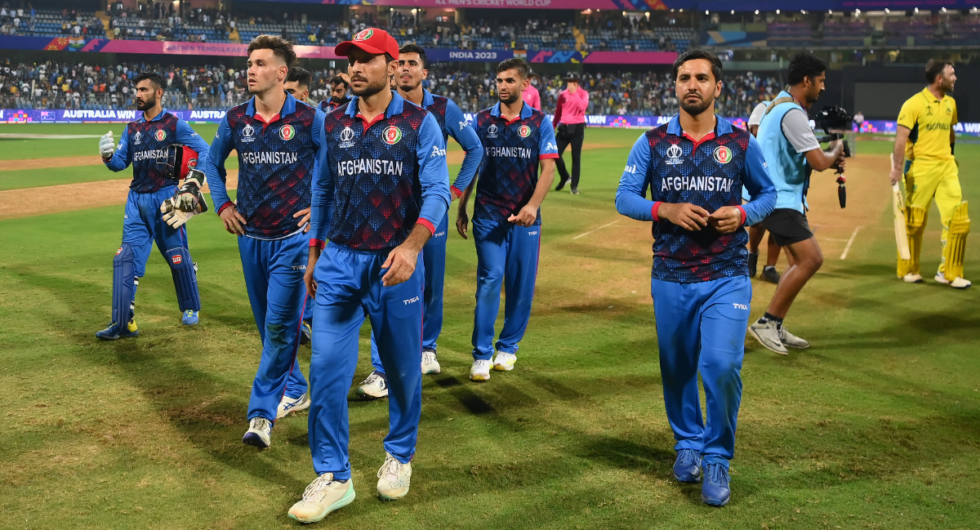Afghanistan fell victim to an all-time great innings, but they should be ruing their missed opportunities

Glenn Maxwell produced the greatest ODI innings of all time in Mumbai last night, and its instant supremacy above all others is a testament to its calibre, audacity and sheer power. But there were moments that Afghanistan should have taken, which would have saved the history books from updating their lists.
All of the highlight reels from Maxwell’s innings will show the fireworks. The one-legged pulls and flicks over the boundary, the dramatic collapse on the floor as if seizing in pain, but the inauspicious start to his innings should also be included, if only to contextualise the scale of the knock.
He came in on a hat-trick ball, Azmatullah Omarzai having castled David Warner and nicked off Josh Inglis from the first two balls of his over. On the brink of completely rattling through any chance Australia had at the chase and moving one step closer to a historic semi-final place, Afghanistan had a golden opportunity. With three slips in place, Azmatullah bowled a near-perfect hat-trick delivery. Angled in and scratching Maxwell’s outside edge, just dying before reaching Ikram Alhikil’s gloves. The comedic review in the hope that it had hit Maxwell’s pad plumb in front showed the start of what would be Afghanistan’s downfall.
When the pressure was at its highest and emotions at their most intense, the discussions around taking that review were frantic. They culminated with Hashmatullah Shahidi signalling to send it upstairs with five seconds left on the clock, having been shouted at by five separate players.
Afghanistan have been outstanding in this tournament. They’ve beaten opponents nobody would have given them a prayer against before the competition. But how they’ve responded when the pressure is on shows how new they are to the kinds of situations they’re now finding themselves in. Against New Zealand, in what could have easily turned into a winning position, they dropped three simple catches which allowed Tom Latham and Glenn Phillips to turn the match on its head. At the Wankhede, it was again in those moments that the match slipped away.
A critical over from Noor Ahmed with Australia seven down will be the one the Afghanistan team replay over and over in their heads as the moment(s) they needed to take. Given out off its second ball, a successful review from Maxwell showed the ball inexplicably bouncing over the stumps. Noor followed up with sending five wides down the leg side before Maxwell brought out the reverse – a sure sign he was starting to hit his straps. Then came the drop.
Any estimate of how many times Mujeeb Ur Rahman has thought about that split second in his life since yesterday evening will likely be an underestimate. An endless video replays of that ball lobbing gently towards him at backward square, both hands to it – he’ll probably imagine the ball nestling safely in his grasp, with what was to come erased from the scorecards. But in reality, he watched as it trickled along the floor.
That should have been the moment. But there were other opportunities, more subtle ones, that were missed.
Afghanistan’s spin attack, the best in the tournament who had been pinpoint accurate early in the innings, started to err as Maxwell neared his hundred. His treatment of Noor, playing in just his sixth ODI, smashing him for back-to-back sixes as he kept bowling on the stumps, was easy brutality. Mujeeb also kept at the float-it-up full tactic and watched as consecutive balls flew to the boundary. Everything was in Maxwell’s arc, and slot ball after slot ball was dispatched as he blew past three figures.
From 91-7 to 293-7
The highest men’s ODI score for Australia
Third men’s World Cup double-hundred
The highest score in a men’s ODI chaseGlenn Maxwell take a bow 👏👏👏#CWC2023 #AUSvsAFG #GlennMaxwell pic.twitter.com/w0l0f0q8Db
— Wisden (@WisdenCricket) November 7, 2023
With runs required to win ticking down below 100, the freneticism in the field increased. By this point, Maxwell was on one leg, unable to run between the wickets with any effectiveness, and unable to make any use of his feet at the crease. Yet, instead of taking advantage of Maxwell’s need to deal in boundaries by throwing the ball wide outside his off stump, requiring him to both reach for it and ensure there was enough power to reach the rope, it was served up to him almost every time.
When the singles were taken, Maxwell hobbling down the pitch at a pace barely above walking, the throws at the stumps were wayward. Any attempts to break up the play and retake control were half-hearted as bowlers turned back to their marks attempting to avoid eye contact with their teammates, only lifting their heads to receive the ball thrown back from the advertising boards. There were four players on the field who have captained Afghanistan on multiple occasions. Yet, for the second half of Maxwell’s innings, they looked decisively short on leadership.
The on-field reaction couldn’t have been different from the head coach’s on the sidelines. With every six, Jonathan Trott kept writing his surely copious notes for the team debrief. What he’s achieved with Afghanistan is extraordinary, but if they are to make the jump to the highest tier of international teams, how they respond in most pressurised situations is his next frontier.
There’s a temptation, when a batter plays an innings as extraordinary as Maxwell‘s to shrug your shoulders and say: ‘You can’t do much when someone’s playing like that’. While there is an element of truth to that statement, there were definitely things Afghanistan could’ve and should’ve done differently, which might have produced a different outcome.
To bet on the World Cup with our Match Centre Partners bet365 head here.

